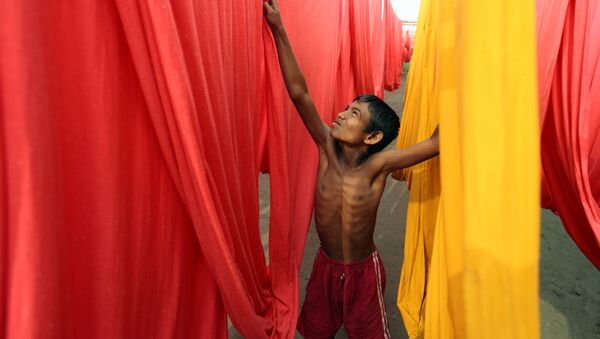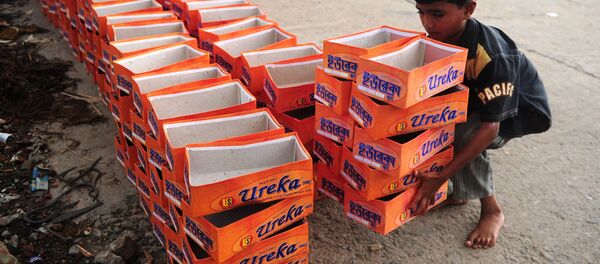The coalition consists of Clean Clothes Campaign, Human Rights Watch, IndustriALL Global Union, the International Corporate Accountability Roundtable, the International Labor Rights Forum, the International Trade Union Confederation, the Maquila Solidarity Network, UNI Global Union, and the Worker Rights Consortium.
Do u know how the workers who make your clothes are treated? Act now & tell major clothing brands to #GoTransparent. https://t.co/g4ymSAAuId pic.twitter.com/ha9oJ38UnK
— Nisha Varia (@Nisha_Varia) April 21, 2017
Their 40-page report, Follow the Thread, is published just prior to the fourth anniversary of the Rana Plaza disaster in Bangladesh, the deadliest structural collapse in modern history, which claimed the lives of 1,135 and injured over 2,000. It was preceded by two large factory fires — one in Pakistan's Ali Enterprises factory, the other in Bangladesh's Tazreen Fashions factory — that killed over 350 in tandem. Afterward, labor advocates could not determine which companies' products were made at these factories, and had to hunt for the brand labels from the factory sites and interview surviving workers to determine who was responsible.
More Brands Should Reveal Where Their Clothes are Made https://t.co/VHA9w7AGa6 #GOTransparent @hrw
— Nathalia Ramos (@nathalia73) April 20, 2017
The report calls on companies to adopt the Apparel and Footwear Supply Chain Transparency Pledge. Companies that adhere to the pledge agree to publish information identifying factories that produce their goods, addressing a key obstacle to rooting out abusive labor practices in the industry, and helping to prevent repeats of calamities such as the Rana Plaza collapse.
Do you know which factories your clothes came from? Act now & tell major clothing brands to #GoTransparent. https://t.co/JWBlzpYo2S pic.twitter.com/TDSmOIWezx
— Edward Herbert (@ed_herbert) April 20, 2017
The Pledge draws upon existing best practice guidance and aims to set basic, universal standards of supply chain transparency, asking apparel companies to key important information about supplier factories and authorized subcontractors. The aim is to assert workers' human rights, advance ethical business practices and human rights due diligence in apparel supply chains, and build stakeholder trust, in line with United Nations Guiding Principles on Business and Human Rights.
"A basic level of supply chain transparency in the garment industry should be the norm in the 21st century. Openness about a company's supply chain is better for workers, better for human rights, and shows that companies care about preventing abuse in their supply chains," said Aruna Kashyap, Senior Counsel for Women's Rights at Human Rights Watch.
Moreover, there is intense pressure for apparel companies to publicize their supplier information among the investment community.
'Corporate Human Rights Benchmark' launching today in London https://t.co/f2kdIpvCnl #bizHumanRights via @BHRRC @ihrb #ESG #CSR pic.twitter.com/PLisMWhSLC
— richardbrophy (@richardbrophy) March 13, 2017
Most recently, the Corporate Human Rights Benchmarks, endorsed by 85 investors representing US$5.3 trillion in assets, score-carded apparel companies' supply chain transparency, demanding they publish at least the names of factories that produced for them.
"After Rana Plaza and other disasters, human rights groups, unions, and some companies and investors have seen how important transparency is for preventing abuses and for efforts at accountability. Companies need to put transparency into practice to show they respect human rights and decent working conditions," said Ben Vanpeperstraete, Lobby & Advocacy Coordinator at the Clean Clothes Campaign International Office.
We want @UrbanOutfitters @Forever21 @Walmart @Primark & @armani to #GoTransparent & publish their supply chain https://t.co/js2RayOmP1 pic.twitter.com/IIf4CxbcTQ
— Human Rights Watch (@hrw) April 21, 2017
The coalition contacted 72 companies and asked them to adopt the Pledge. The report details their responses and measures their supply chain transparency practices against the Pledge.
Of the companies contacted by the coalition, 17 will be in full alignment with the Pledge standards by December. This includes, Adidas, ASICS, ASOS, C&A, Clarks, Cotton On Group, Esprit, G-Star RAW, H&M Group, Hanesbrands, Levis, Lindex, New Look, Next, Nike, Patagonia and Pentland Brands.
Of those not in alignment with the standards, and won't be by December, five (including Gap, John Lewis, Marks and Spencer and Tesco) adhere to transparency practices falling just short of the pledge's standards, 18 are "moving in the right direction" by disclosing the names and addresses of cut-make-trim factories, and seven are taking small steps toward publishing supplier factory information.
Which global clothes companies are refusing to #GoTransparent about whether their workers suffer rights abuses? @HRW https://t.co/zD1JjJvG9A pic.twitter.com/pM3MI5RBMi
— Gerry Simpson (@GerrySimpsonHRW) April 20, 2017
Some claimed disclosure would place them at a commercial disadvantage, but the coalition says such a justification is clearly contradicted by the fact other companies are publishing such information.
These companies include American Eagle Outfitters, Canadian Tire, Carrefour, Desigual, DICK'S Sporting Goods, Foot Locker, Hugo Boss, KiK, MANGO, Morrison's, Primark, Sainsbury's, The Children's Place, and Walmart.
Others, such as Armani, Carter's, Forever 21, Matalan, Ralph Lauren Corporation, Rip Curl, River Island, Shop Direct, Sports Direct, and Urban Outfitters neither responded to the coalition nor published any supply chain information.
The coalition is urging these firms to align themselves with the pledge by December, in order to compel the apparel industry en masse toward a basic level of supply chain transparency.




